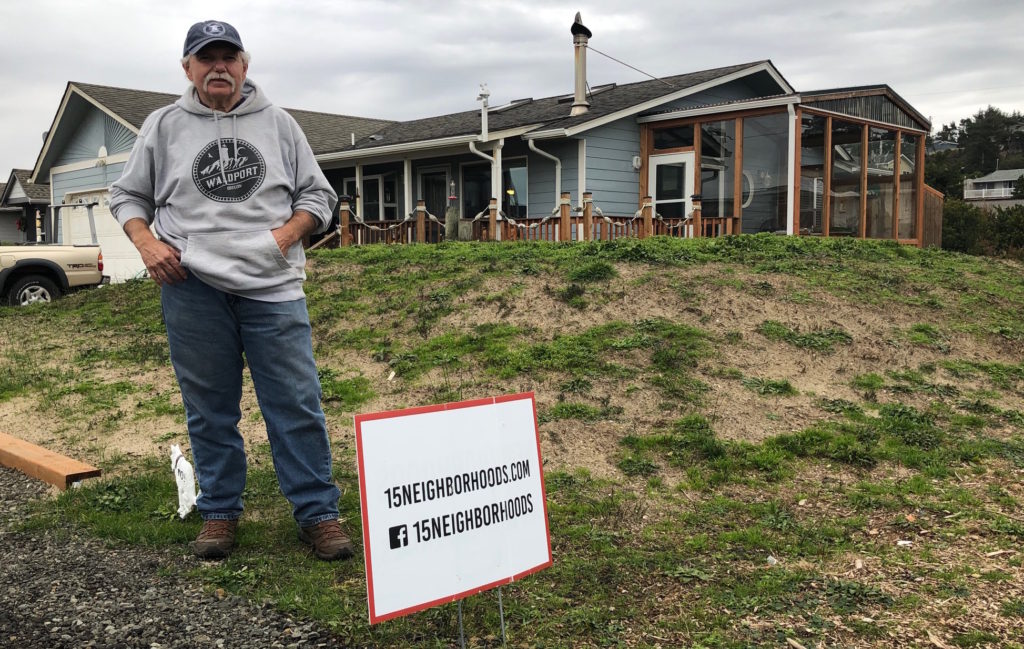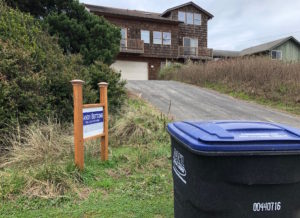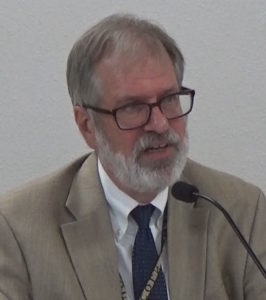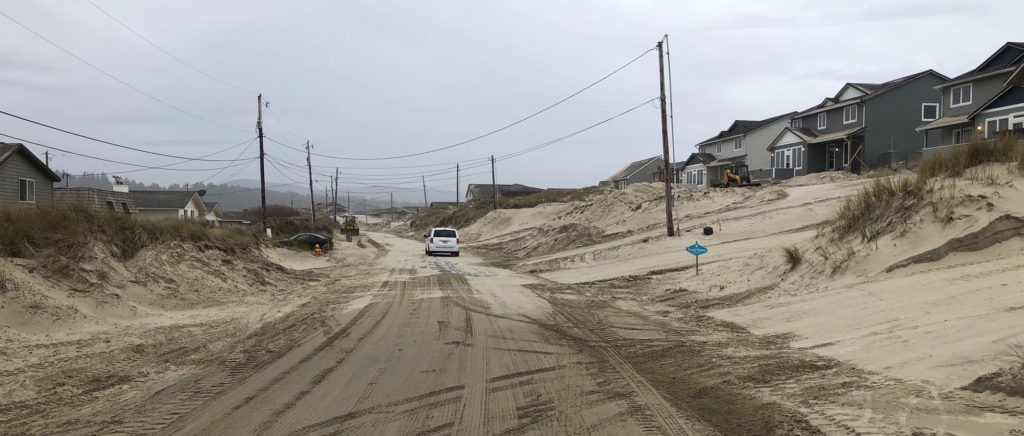
By QUINTON SMITH/YachatsNews.com
Supporters of short-term rentals came out in force Wednesday night during a re-boot of Lincoln County’s long process considering tighter regulations on nearly 600 vacation rentals operating in unincorporated areas of the county.
Vacation rental owners and representatives of management companies championed the economic impact they provide, that tightening of regulations would stifle their income or retirement dreams, and that they were the target of over-zealous neighbors simply opposed to sharing the beauty of the Oregon coast.
“Every five years there’s a new round of retirees trying to make their neighborhoods a gated community,” said Heather Brand, who said her study of county complaint data showed most issues were originating in clusters of dense neighborhoods such as Bayshore, Bella Beach, Miroco, and Surfland. “We shouldn’t have to do this fire drill every five years when a new batch of owners shows up.”
But homeowners asking for tighter regulations and a limit on licenses testified that vacation rentals were over-running their beachfront neighborhoods. They talked about the constant stream of visitors, out-of-control parties, year-round fireworks, loose dogs, and cars parked everywhere.

“I have been flabbergasted by the loss of community with the influx of short-term rentals,” said Jill Stone, who lives in the Bayshore subdivision north of Waldport, and was part of large contingent of Bayshore homeowners and rental owners who testified at the online meeting. “We don’t put motels in the middle of neighborhoods … and that’s what’s happening.”
The 3-hour online workshop is a re-start of Lincoln County’s 2-year-old examination of vacation rental regulations in unincorporated county – areas outside of the seven cities. The number of rentals exploded – there are now 566 — in the past three years as cities from Yachats to Lincoln City began limiting licenses or locations and were attracted by the county’s loose regulations and meager enforcement.
Interrupted by coronavirus, fire emergencies
Wednesday’s session was the first since last February, when the county held two sessions to hear reaction to regulation ideas. But first the coronavirus pandemic and then September wildfires in Otis delayed more significant progress on the revised regulations – and a discussion by the three Lincoln County commissioners of a possible cap on the number of licenses.
To give the county a chance to catch up as the process stalled, commissioners put a moratorium on new licenses, extending it three times last year before setting a final moratorium date of June 1.
The lack of progress spurred formation of a group of neighborhood organizations to undertake signature collecting to possibly put an initiative on the May or November ballot to phase out over five years all vacation rentals in single-family zoned areas of unincorporated Lincoln County. An industry group called ViaOregon has formed to fight the effort and lobby against drastic changes to the county’s regulations.

Among other things, county staff is now proposing to:
- Require septic systems serving short-term rentals to be inspected yearly to see if they are working properly, and for inspectors to determine the capacity of each system. The inspections would help establish an occupant capacity for each rental.
- Limit a rental’s maximum occupancy – with a few grandfathered exceptions — to two people per bedroom. The proposal would also have occupancy limits in effect day and night to prevent the rental from being used for large gatherings or events. The county currently bases capacity on a total of three overnight guests per bedroom plus two others, one of the most lenient in Oregon.
- Develop new or refine the current “three strikes” rule under which rental owners lose their license if they get three verified complaints not addressed or responded to in a timely manner.
- Discuss a permanent cap on the number of licenses, or determine if there should be geographic areas in unincorporated Lincoln County with their own caps, and if or how to allow licenses to be transferred to a new property owner.
On Wednesday, county counsel Wayne Belmont said staff was exploring three other recently suggested ideas, including:
- Licensing vacation rental management companies to better ensure compliance with regulations and make sure they are paying the county’s 10 percent lodging tax;
- Establishing parking limits;
- And, limiting or staggering the number of nights a house could be rented.
There is supposed to be a second workshop before commissioners begin debating the issue, but it has not been scheduled. Speakers Wednesday night also urged the county to collect much more data on zoning, complaints and enforcement, economic impact before making decisions.
Sorting through the issues
Dozens of people spoke during their allotted three minutes Wednesday night, 177 registered for the Zoom meeting, and as many as 85 watched live on the county’s YouTube channel.
Economic impact
Rental management companies touted the economic impact of allowing visitors to stay in homes rather than motels, pointing out all the contractors and cleaners who cared for the homes and the hundreds of tourist-related businesses who benefitted. Their representatives pointed to a study commissioned by ViaOregon that said short-term rentals in the county supported 3,600 jobs, $192 million in local wages and that $3.8 million had been spent on renovations.
“Lincoln County has had the highest unemployment rate in Oregon since the pandemic,” said Aaron Linfoot of Meredith Lodging, arguing that a license cap and occupancy limits will further damage the economy.
“Why are we putting this revenue stream at risk,” asked Morgan Mann, who owns a rental in Beverly Beach, citing money spent by the thousands of tourists who visit every year.
But opponents said vacation rentals in residential neighborhoods are really just businesses in areas not properly zoned for them.
“Why is someone’s right to make money more important than a neighborhood’s rights,” asked Jim Kalby.
Septic systems & occupancy limits
The county’s idea to require yearly examinations of septic systems was also attacked by many short-term rental owners, who felt they were being singled out. If septic systems are a health issue, they argued, then make yearly checks a requirement for all homeowners who use them.
“Who’s being targeted specifically because they’re unwanted,” asked Cari Neville.
Supporters argued that coastal septic systems for 2- or 3-bedroom houses were not designed to handle houses with 10-12 visitors staying there.
Opponents also attacked the county’s suggestion to limit occupancy, even though Belmont has said previously it is one of the most generous in Oregon. They argued that it would prevent many family gatherings, one of the attractions of groups renting a house instead of staying in a motel.
Belmont has said limit is intended to cut the number of people staying in homes, which county staff believe is the No. 1 source of problems involving parking, large events, rowdiness and conflicts with neighbors.

Neighborhood impact
The biggest issue for proponents of tighter regulations is the livability of their residential neighborhoods. The issue seems to have especially cropped up in the Bayshore subdivision near Waldport, which is now dotted with signs opposing short-term rentals.
Monica Kirk, of the the leaders of the 15neighborhoods group, said they are not opposed to short-term rentals overall, but object to them in neighborhoods zoned for single-family houses. Unincorporated Lincoln County “became the Wild West” for vacation rentals, she said, when cities began limiting licenses or restricted them by zones.
“We don’t have the kind of restrictions that cities do,” Kirk said.
That was the message of a handful of Bayshore residents, who said the growing number of vacation rentals now in their community is changing its character.
“We have been inundated with over 100 vacation rentals,” said Reba Lovelady.
“We did not anticipate our neighborhood becoming a vacation zone,” said Shelly Woodlee, who moved from Alaska to Bayshore three years ago. “Where are our neighbors now?”
But three Bayshore rental owners testified how they took rundown houses, spent thousands on fixing them up, and mix their own use with short-term renters help bridge the time to when they can retire in the community.
“We feel we’ve taken the property and enhanced the neighborhood,” said Kenneth Guptill, who said he bought a decrepit Bayshore property five years ago and now pays $11,000 a year in property and lodging taxes. “I don’t understand this movement …”
Middle ground and solutions?
Many others who spoke Wednesday night wondered if there was a middle ground somewhere in this complicated issue.
Although the sheriff’s office has purchased software to seek out unlicensed rentals and can now better track complaints, most speakers said enforcement of existing regulations is weak. Having just two deputies – one of which is often called away on other emergencies – to respond to complaints is not enough, speakers said.
“Enforcement is the No. 1 thing we need,” said Jon Lynch, a Newport real estate agent.
Others – including Brand who is studying three years worth of complaints and real estate agents who deal constantly with the issues – encouraged the county to consider a more difficult but targeted zoning approach for dense neighborhoods like Bayshore and Bella Beach where issues and complaints are more frequent.

Jaime Michel of Sweet Homes Vacation Getaways and a co-founder of ViaOregon, said their group has given commissioners a position paper suggesting the county form a group from the various sides to “bring back a workable plan.” This would include mediation programs and enhanced enforcement, she said.
“We have a neighbor-to-neighbor problem, not a short-term rental problem,” Michel said.
– – – – – –
Comments are compiled on the short-term rental section of the county’s website. Wednesday’s workshop can be seen on the county’s YouTube channel.


